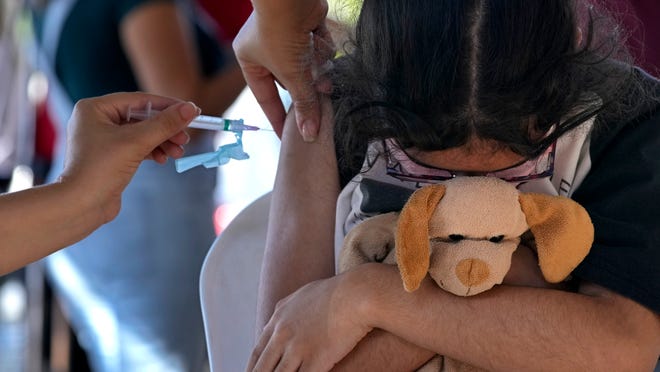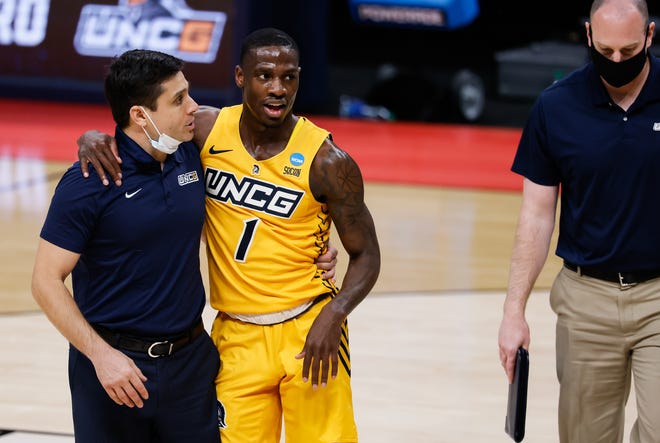
Your child was exposed to COVID-19 and you're trying to get them back into the classroom. You bought tickets to a concert coming up, or you have a long-awaited international trip with family or friends. Or maybe you aren't vaccinated but your employer is now asking for weekly COVID-19 tests results.
There are many reasons why you might need to get a quick and easy COVID-19 test result, but some tests are more accurate than others, experts say. Some may be accepted and some may not be, depending on the situation. Making the situation even more complicated: some tests are in low supply.
What you need to know: Ask and be sure the place requiring the test result will accept the type of test you're taking and, in some cases, whether it had to be taken in front of a witness or proctor.
One of the quickest ways to get a COVID-19 test result is through at-home rapid testing. Before you run to the nearest Walgreens or CVS, though, know this: some schools, venues and airlines don't accept at-home test results.
Why?
Rapid antigen tests for the virus are "generally less sensitive" than PCR tests, according to Hamilton County Public Health. Those tests perform best if the person is tested when their viral load is high and in symptomatic people.
"The antigen level in specimens collected either before symptom onset, or late in the course of infection, may be below the tests’ limit of detection," according to the health department. "This may result in a negative antigen test result, while a more sensitive test(...) may return a positive result."
The 'gold standard' of tests: PCR
The best, most accurate test for COVID-19 remains RT-PCR tests, which generally take a couple of days to produce results. The tests detect the presence of the virus if you have an active infection at the time of the test, as well as revealing whether you have been previously infected.
"These tests are highly sensitive and specific, but a false negative result is possible," according to Hamilton County Public Health.
Schools have no single required test
Each school district in the Cincinnati region has different protocols for which COVID-19 test results they accept.
Cincinnati Public Schools accepts rapid COVID-19 tests by a provider, but not the at-home kind. Students can get tested by their school nurse, district spokesperson Krista Boyle said.
The Northern Kentucky Health Department has also advised districts not to use at-home kits to test out of quarantine.
"Tests used for that purpose (ending quarantine) require a monitored test taken by a primary care physician or an approved testing site/facility," Paula Rust, Kenton County Schools director of health services, said. "Currently the district doesn’t ask the method for testing positive when a case is reported, nor do we ask for a copy of the positive test results. However, if someone is testing to shorten quarantine, we do require a copy of the results to ensure it is not an 'at-home test' before approving a revised return date."
But other districts in the area do accept and/or provide at-home tests to students.
Fairfield City Schools spokesperson Gina Gentry-Fletcher said the district provides free BinaxNow COVID-19 rapid tests to families if they ask for one.
"We can accept at-home test results as long as the test was proctored via telehealth, according to the instructions that are included with the test. This directive comes to us from the Butler County General Health District," Betsy Fuller, spokesperson at Lakota Local Schools, said. "At this time, we are not distributing at-home rapid tests to our families."
Lack of consensus on tests extends elsewhere
Schools aren't the only places where there's no single standard on what tests are acceptable.
If you go to Cincinnati's Music Hall or Aronoff Center for the Arts and you don't have a vaccination card, you can show a negative antigen test result from the last 24 hours and gain admittance. But the test has to be obtained from a health care provider or pharmacy – or it can be an at-home test performed in front of a proctor. You also can give a PCR test from the last 72 hours.
But at Newport's new Promowest Pavilion at Ovation, at-home tests are not accepted.
Not all local concert venues require vaccinations or a negative test. The Cathedral Basilica of St. Peter in Chains hosts a concert series, with an Oct. 8 event featuring the British singing group Voces8, and it has no vaccine or testing mandates, for example.
If you're planning international travel, you may have to present a negative COVID-19 test to enter another country - and a negative test to get back in the U.S. The tests will be required even if you're vaccinated.
Let's say you're traveling to Canada. Don't take the result from any antigen test north of the border, because it won't be accepted, according to a government website. After the flight back, you'll need a negative test for reentry – but the U.S. will accept some types of self-administered antigen tests, the CDC says. If your trip is three days or less, a PCR test taken in the U.S. will work for entry into Canada and your return to America.
Finally, as more employers require vaccinations or regular testing, workplaces may specify what kind of tests they will accept. Vaccine mandates imposed by Cincinnati Public Schools and the city of Cincinnati, which take effect next month, allow employees to regularly test instead of taking the jab. But the mandates don't specify what kind of test that employees opting not to be inoculated must take.
Enquirer investigations and enterprise editor Mark Wert contributed.
Source link








